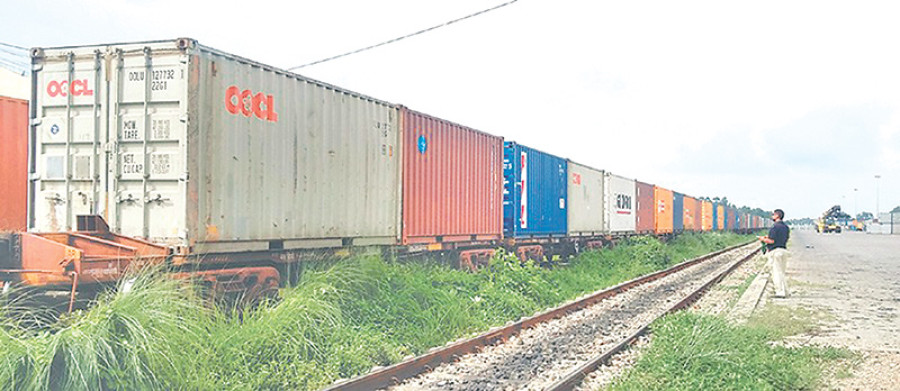Money
India ‘agrees’ to set aside 125 rail cars
India has agreed in principle to increase the number of dedicated railway rakes for shipping goods to Nepal fivefold to 125.Nepal asked India for additional rakes as Nepali traders were having a hard time getting freight wagons to transport third country imports from Kolkata port. Sometimes, they had to wait for months to transport their goods from Kolkata to Nepal.
India has agreed in principle to increase the number of dedicated railway rakes for shipping goods to Nepal fivefold to 125.Nepal asked India for additional rakes as Nepali traders were having a hard time getting freight wagons to transport third country imports from Kolkata port. Sometimes, they had to wait for months to transport their goods from Kolkata to Nepal.
The inability of Indian Railways to provide an adequate number of rakes has been affecting smooth transportation of Nepal-bound goods, leading to increased cost and time. It was particularly difficult for importers of chemical fertilizers and raw materials.
Around 38,500 tonnes of urea destined for Nepal is currently piled up at Kolkata port while another 2,500 tonnes has been sitting at Haldia port because Indian Railways has not provided rakes to transport the fertiliser. The fertiliser was ordered by state-owned Agriculture Inputs Company and Salt Trading Corporation, according to Tarka Raj Joshi, chief of the Sirsiya Dry Port Office of the Nepal Intermodal Transport Development Committee.
Nepali traders mostly use Kolkata and Haldia ports to import goods from third countries. Shipments have soared since India lifted the four-month-long trade embargo against Nepal in February, 2016. However, a shortage of rakes has delayed transportation of goods from these ports to Nepal. On Saturday, 1,230 containers could not be dispatched from Kolkata port to the dry port in Birgunj due to lack of railway rakes. On the same day, 589 containers filled with goods and 313 empty containers could not be sent to Kolkata from the dry port in Birgunj because of the same problem.
Indian Railways has allocated 18-20 rakes for transporting goods to and from Birgunj Dry Port. Rabi Shankar Sainju, joint secretary of the Commerce Ministry, said they had proposed to provide at least 100 dedicated railway rakes to Nepali importers from Kolkata and Vishakhapatnam ports in a bid to resolve the problem. “The Indian side has responded positively to our request,” he said.
Nepal made the proposal during a meeting of the Inter-Governmental Sub-Committee (IGSC) that concluded in Nepal on Friday. The joint secretary-level conference is the first technical committee meeting since 2011.
During the recently concluded Nepal-India Inter-Governmental Committee (IGC) meeting, the two countries agreed to review the different existing treaties related to trade and commerce, in particular the transit agreement and the Railway Service Agreement.
During the review, Nepal asked India to open additional sea routes, accept electronic documents from Nepali traders and allow private Indian railway companies to transport goods to the dry port.
Likewise, Nepal has requested India to extend railway services to Nepal’s main customs points such as Biratnagar, Bhairahawa and Nepalgunj. Currently, India provides railway service only to Birgunj. Following the bilateral meeting, railway service has been extended to Biratnagar. The first cargo train from Kolkata port to Biratnagar reached Bathana, Bihar near the Nepal-India border on Sunday.




 14.24°C Kathmandu
14.24°C Kathmandu














